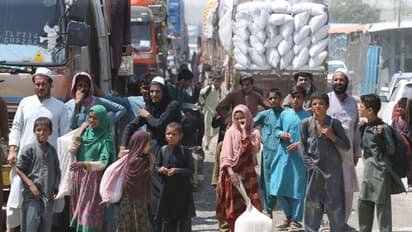European Union pledges 1-billion Euro assistance package for Afghanistan

Synopsis
According to a statement, the remaining is sent to neighbouring nations taking in Afghans fleeing Taliban rule. Von der Leyen committed during a virtual G20 conference hosted by Italy to examine Afghanistan's humanitarian and security situation.
The European Union offered a one-billion-euro ($1.2-billion) assistance package for Afghanistan on Tuesday, pledging to "avert a severe humanitarian and socioeconomic collapse," according to the bloc's leader, Ursula von der Leyen. The money adds 250 million euros to the EU's previously pledged 300 million euros for urgent humanitarian needs. According to a statement, the remaining is sent to neighbouring nations taking in Afghans fleeing Taliban rule. Von der Leyen committed during a virtual G20 conference hosted by Italy to examine Afghanistan's humanitarian and security situation.
Her statement emphasised that the EU funding will be sent to foreign organisations operating on the ground rather than the Taliban's interim government, which Brussels does not recognise. EU development funding, as opposed to humanitarian help, remains frozen. Von der Leyen observed that they must do everything possible to prevent a massive humanitarian and economic catastrophe in Afghanistan and must act quickly. She stated that they have been quite explicit about the terms of any cooperation with the Afghan authorities, including the respect for human rights. So far, the reports are self-explanatory.
Also Read | Blankets, coats, essential goods: China sends 1st batch of aid to 'Taliban govt' in Afghanistan
The EU nations are concerned about a spike of Afghan asylum seekers attempting to enter the bloc, as in 2015 with Syrians fleeing their conflict. According to Brussels' calculations, providing money to assist and stabilise Taliban-ruled Afghanistan and nations between it and Europe might halt any influx. Von der Leyen has stated that EU nations, particularly those that took part in the NATO operation that was quickly disbanded in August as the Taliban surged to power, had a "moral obligation" to assist Afghans.
The one-billion-euro assistance package unveiled today would increase health-care investment in Afghanistan. It will aid in migration management and encourage collaboration in the fight against terrorism, crime, and migrant smuggling in neighbouring countries.
Check the Breaking News Today and Latest News from across India and around the world. Stay updated with the latest World News and global developments from politics to economy and current affairs. Get in-depth coverage of China News, Europe News, Pakistan News, and South Asia News, along with top headlines from the UK and US. Follow expert analysis, international trends, and breaking updates from around the globe. Download the Asianet News Official App from the Android Play Store and iPhone App Store for accurate and timely news updates anytime, anywhere.